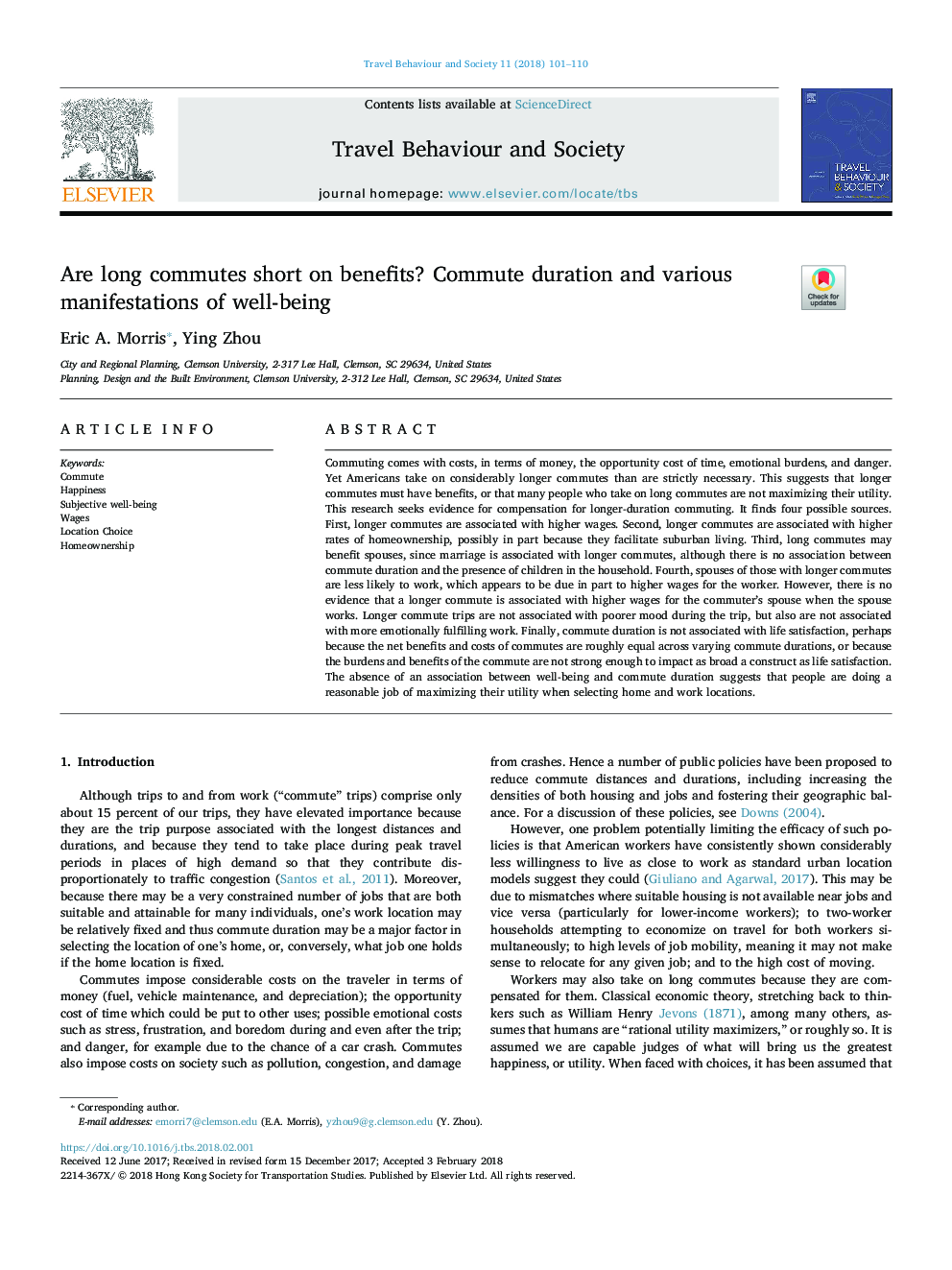| کد مقاله | کد نشریه | سال انتشار | مقاله انگلیسی | نسخه تمام متن |
|---|---|---|---|---|
| 6576348 | 1422800 | 2018 | 10 صفحه PDF | دانلود رایگان |
عنوان انگلیسی مقاله ISI
Are long commutes short on benefits? Commute duration and various manifestations of well-being
ترجمه فارسی عنوان
آیا رفت و آمد طولانی کوتاه در مزایای؟ مدت زمان سفر و تظاهرات مختلف رفاه
دانلود مقاله + سفارش ترجمه
دانلود مقاله ISI انگلیسی
رایگان برای ایرانیان
کلمات کلیدی
رفت و آمد خوشبختی رفاه ذهنی، دستمزد، انتخاب محل مالکیت خانه،
ترجمه چکیده
مسافرت با هزینهای از نظر هزینه، هزینه فرصت برای زمان، بارهای احساسی و خطر همراه است. با این حال، آمریکایی ها حملات قابل توجهی طولانی تر از حد ضروری را انجام می دهند. این نشان می دهد که رفت و آمد های طولانی باید مزایا داشته باشد یا اینکه بسیاری از افرادی که در سفرهای طولانی هستند، ابزار کمکی را به حداکثر برسانند. این تحقیق به دنبال شواهدی برای جبران خدمت طولانی مدت است. این چهار منبع ممکن را پیدا می کند. اول، رفت و آمد های طولانی با دستمزد بالاتر مرتبط است. دوم، رفت و آمد های طولانی با نرخ بالاتری از املاک و مستغلات مرتبط است، شاید بخشی از آن که زندگی حومه را تسهیل می کنند. سوم، رفت و آمد های طولانی می تواند به همسران خود برسد؛ زیرا ازدواج همراه با رفت و آمد طولانی است، اگر چه ارتباطی بین مدت رفت و آمد و حضور فرزندان در خانوار وجود ندارد. چهارم، همسران کسانی که سفرهای طولانی دارند کمتر کار می کنند، که به نظر می رسد ناشی از بخشی از افزایش دستمزد کارگر است. با این حال، شواهدی وجود ندارد که یک رفت و آمد طولانی با دستمزد بالاتر برای همسر رفت و آمد شده در هنگام همسر وجود داشته باشد. سفرهای طولانی تر مسافرتی با خلق و خوی فقیر در طول سفر همراه نیست، بلکه با کارهای عاطفی بیشتر همراه نیست. در نهایت، مدت زمان رفت و آمد با رضایت زندگی ارتباط ندارد، شاید به این دلیل که مزایای خالص و هزینه های رفت و آمد در طول دوره های مختلف رفت و آمد تقریبا برابر است، یا به این دلیل که بارها و مزایای رفت و آمد به اندازه کافی قوی برای تاثیر به عنوان یک ساختار گسترده به عنوان رضایت زندگی . فقدان ارتباط بین رفاه و مدت زمان رفت و آمد نشان می دهد که مردم در انجام انتخاب خانه و محل کار، کار مناسبتری برای به حداکثر رساندن استفاده از ابزار خود می دهند.
موضوعات مرتبط
علوم زیستی و بیوفناوری
علوم محیط زیست
مدیریت، نظارت، سیاست و حقوق
چکیده انگلیسی
Commuting comes with costs, in terms of money, the opportunity cost of time, emotional burdens, and danger. Yet Americans take on considerably longer commutes than are strictly necessary. This suggests that longer commutes must have benefits, or that many people who take on long commutes are not maximizing their utility. This research seeks evidence for compensation for longer-duration commuting. It finds four possible sources. First, longer commutes are associated with higher wages. Second, longer commutes are associated with higher rates of homeownership, possibly in part because they facilitate suburban living. Third, long commutes may benefit spouses, since marriage is associated with longer commutes, although there is no association between commute duration and the presence of children in the household. Fourth, spouses of those with longer commutes are less likely to work, which appears to be due in part to higher wages for the worker. However, there is no evidence that a longer commute is associated with higher wages for the commuter's spouse when the spouse works. Longer commute trips are not associated with poorer mood during the trip, but also are not associated with more emotionally fulfilling work. Finally, commute duration is not associated with life satisfaction, perhaps because the net benefits and costs of commutes are roughly equal across varying commute durations, or because the burdens and benefits of the commute are not strong enough to impact as broad a construct as life satisfaction. The absence of an association between well-being and commute duration suggests that people are doing a reasonable job of maximizing their utility when selecting home and work locations.
ناشر
Database: Elsevier - ScienceDirect (ساینس دایرکت)
Journal: Travel Behaviour and Society - Volume 11, April 2018, Pages 101-110
Journal: Travel Behaviour and Society - Volume 11, April 2018, Pages 101-110
نویسندگان
Eric A. Morris, Ying Zhou,
